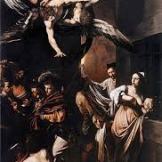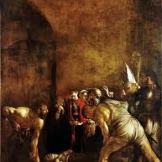
I recently attended the Glasgow launch of Helen Taylor’s debut novel The Backstreets Of Purgatory. It was a fascinating and refreshingly different approach to a book event. Instead of the usual chat with chair/readings/Q&A format Taylor replaced the former with a talk on the life and work of the infamous Italian painter Caravaggio (along with an old-school approach to slideshows – see right) to a packed Byres Road Waterstones.
This decision was not as left-field as it may sound as Caravaggio not only plays a major part in the plot of The Backstreets Of Purgatory, but also the structure, with chapters being named after the artist’s paintings (a selection of which are at the bottom of this review). But the important question is, “Is the book any good?”. The short answer is “Very”. The long answer begins now.
I had no knowledge of The Backstreets Of Purgatory before its launch, and only a little more than that afterwards as Taylor avoided spoilers even after her reading.
The back cover proclaimed it as “Caravaggio In Glasgow, A Tale of Art, Insanity And Irn-Bru”. While pithy, that doesn’t begin to tell the whole story. Struggling Glaswegian artist Finn Garvie dreams of being the city’s answer to Michelangelo Merisi da Caravaggio, but spends most of his time contemplating work rather than creating it, occasionally caricaturing patrons of the local Bingo. His long-suffering girlfriend, Lizzi, senses he views their relationship in a similarly lackadaisical fashion. This is in part due to Finn discovering a new muse in the shape of au pair Kassia, who, to his chagrin, doesn’t want to know.
Finn’s world is complicated further by the appearance of the man himself, Caravaggio. It is said you should never meet your heroes, and this proves to be the case for Finn as the man is even more feckless than he is, eschewing any form of hygiene, preferring to get drunk and abuse people, and regaling his new companion with bon mots such as, “My feet are as blistered as a syphilitic cock” as they make their way around Glasgow’s West End.
Although this sounds fantastical, and comical, which it is, there are serious themes examined in Taylor’s novel. Addiction, mental health, self-harm, paedophilia, abuse of power, the destructive nature of obsession, and much more. This is never more clearly represented than with the character of Tuesday, a drug addict who has been abused from a young age, and who holds on to the hope that her life can be rescued by someone who helped ruin it. Make no mistake, this is a novel which explores the human condition with a forensic eye. It is also beautifully written. The rhythm of the language and prose is at times poetic, and this is clearly a writer who takes what she does very seriously.
The Backstreets Of Purgatory touches upon many themes which pertain to Scottish literature. The psychological vs the supernatural has a long tradition from James Hogg’s The Private Memoirs and Confessions of a Justified Sinner and Robert Louis Stevenson’s The Strange Case of Dr Jekyll and Mr Hyde to James Robertson’s The Testament of Gideon Mack and John Burnside’s The Devil’s Footprints, but Taylor’s novel also displays the Glaswegian grit of James Kelman, Archie Hind and Jeff Torrington, and could easily be placed alongside the best of the Chemical Generation of Irvine Welsh, Laura Hird, Alan Warner, and particularly Duncan McLean.
Certainly Finn Garvie is a recognisable Scottish anti-hero. In The Scottish Novel Since the Seventies (which I highly recommend) Gavin Wallace writes, “In English novels, the deranged, desperate, the neurotic and the variously addicted might provide the odd deviant diversion to emphasise the reassuring normality of everyone else. In Scottish novels, they are narrators and protagonists, rarely, if ever, fully in control of their existences, and morbidly aware of the fact”. This applies to nearly every character in The Backstreets Of Purgatory. but it is distinct and original and proves Helen Taylor to be an exciting new voice. She has written a Scottish novel of significance and I can’t recommend it enough.
The Backstreets Of Purgatory is published on Unbound.









Commenti